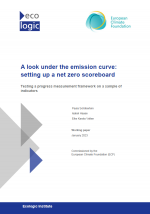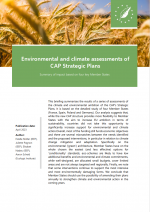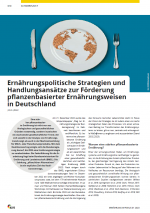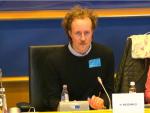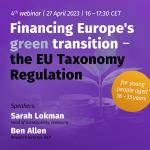Ecologic Institute Newsletter No 247 – April 2023
- Ecologic Institute Newsletter
A Look Under the Emission Curve: Setting up a net zero scoreboard – Document
Indicators measuring progress towards climate neutrality must take into account the often structural, sectoral, and cross-sectoral changes implied by the transition, covering both the economic and social dimensions. To address this, Ecologic Institute developed this working document, testing an indicator framework for assessing the progress made to achieve climate neutrality by 2050. The document offers a glimpse at areas where development is either heading in the right direction or lagging behind.
Outcomes of the CBD COP15 and Their Relevance for the UN Decade for Ecosystem Restoration – Policy Brief
This paper analyzes the outcomes of the CBD COP15, specifically the adoption of the GBF and its implications for the UN Decade for Ecosystem Restoration. Delving into the GBF's long-term status goals for 2050, as well as 23 action goals for 2030, the paper highlights the importance of Action Target 2, which calls for the initiation of effective restoration processes in at least 30% of all degraded terrestrial, inland water, coastal, and marine ecosystems by 2030. It also explores how the UN Decade's global network, knowledge pool, and expertise can significantly contribute to the successful implementation of the GBF's restoration goals. The paper's authors, Gregory Fuchs and Rebecca Noebel of Ecologic Institute, present policy recommendations to ensure that the GBF's ambitious targets are met in a timely and effective manner.
Environmental and Climate Assessments of CAP Strategic Plans – Briefing
This briefing, co-authored by Aaron Scheid from Ecologic Institute, summarizes the results of a series of assessments of the climate and environmental ambition of the Common Agricultural Policy's (CAP) Strategic Plans. It is based on the detailed study of four Member States (France, Spain, Poland and Germany). The briefing's authors conclude that Member States, which have the option to amend their plans once a year, should use this opportunity to increase their ambitions in the current CAP programming period. The authors also propose concrete steps in the right direction. The briefing is available for download.
The German CAP Strategic Plan – Article
The German CAP Strategic Plan has the potential for an ambitious CAP 2023 to 2027. While the debate on the next post-2027 CAP has already begun, Aaron Scheid and Sophie Ittner from Ecologic Institute argue in this article that the German government needs to realize the full potential of the current CAP to increase the ambition towards more climate change mitigation and the protection and enhancement of natural resources and biodiversity. This article is a summary of the report "Environment and Climate Assessment of Germany's Cap Strategic Plan". The article is available online.
Policy Strategies and Approaches to Promote Plant-Based Diets in Germany – Article
What role does policy play in driving plant-based solutions for more sustainable food systems? In this article, Julia Jägle from Ecologic Institute explores policy strategies and approaches to foster plant-based solutions in Germany and provides an international comparison. She demonstrates that Germany has room for improvement and presents political instruments to further promote plant-based food systems and diets. The article is available online.
Challenges and Opportunities in the Use of Ponds and Pondscapes as Nature-based Solutions – Article
This article explores the role of ponds and pondscapes in delivering Nature's Contributions to People and provides an overview of the challenges and opportunities for their broader implementation as Nature-based Solutions. The authors, among them Dr. Manuel Lago (Ecologic Institute), propose a conceptual framework that can help implement Nature-based Solutions for ponds, and identify future research needs. The article is available online.
What Potential Does the EU Single-Use Plastics Directive Have for Reducing Plastic Pollution at Coastlines and Riversides? – Article
This article, co-authored by Mandy Hinzmann and Linda Mederake from Ecologic Institute, uses three scenarios to assess the potential of the EU "Single-Use Plastics Directive" (SUPD) to reduce litter pollution in the environment. The scenario analysis found that the success of the current SUPD can be an important first step, but further legislative action is needed to effectively prevent plastic waste pollution - bans alone are not sufficient. The success of the Directive therefore depends heavily on implementation and enforcement.
The Fight for Better Air Quality in the EU – Podcast
In the latest "Green Deal – Big Deal?" podcast episode, the hosts Ewa Iwaszuk and Aaron Best from Ecologic Institute speak with interview guests Margherita Tolotto (Senior Policy Officer for Air and Noise at the European Environmental Bureau) and Agnieszka Warso-Buchanan (Senior Lawyer in ClientEarth). They discuss the problem of air pollution, the important role lawsuits have played in forcing action, current efforts to bring the law in line with science – and what citizens can do to have their voices heard in this debate. New episodes are released every month and can be accessed online or streamed on popular podcast platforms.
Socioeconomic Effects of EU Renovation Wave Expenditure on Low-Income Groups in the EU27 – Study
The EU also presents the Renovation Wave as a countermeasure against energy poverty, which currently impacts around 34 million EU residents. However, EU-level analyses linking the technical aspects of the plan with socioeconomic criteria related to energy poverty remain scarce. In this paper, Nora Kögel of Ecologic Institute addresses this gap by investigating the distributional effects of reaching the Renovation Wave's 2030 goals in the EU27 countries. The study is available for download.
The Challenges of Certifying Carbon Farming – Speech
Carbon farming promises to mitigate climate change while generating income for farmers – but can this promise be realized, and what are the risks? On 20 March 2023, the European Parliament's Environment and Agricultural Committees held a joint hearing to understand how EU policy can support on-farm carbon sequestration. The hearing featured two panels, including a presentation from Ecologic Institute Fellow Hugh McDonald on the challenges of carbon farming certification. The session was recorded and can be streamed online.
Certifying Soil Carbon Removals – Speech
On 14 March 2023, Ecologic Institute's Hugh McDonald was invited to present on EU carbon removal policy to American University's Scrubbing the Skies webinar series. Alongside Anne Siemons (Oeko-Institut), Hugh McDonald presented a critical soil-focussed assessment of the EU Commission's recently proposed Framework for Carbon Removals Certification. The 1-hour presentation and panel discussion are available to stream online.
The Challenge of Reducing (Micro)Plastic Emissions – Speech
Frequently, media communication and political measures to reduce (micro)plastic emissions focus on the responsibility of private consumers. But to what extent are these actually able to make a significant contribution to the reduction of (micro)plastic emissions? Drawing on results from several interdisciplinary research projects funded under the German research focus "Plastics in the Environment", in her presentation Linda Mederake (Ecologic Institute) shared insights regarding the patterns of societal perception and behavior in dealing with (micro)plastics, as well as the scope for action of different actors to reduce (micro)plastic emissions into the environment.
Fit for Summer – Webinar
In the webinar "Fit for the summer: How can Nature-based Solutions make municipalities more resilient?", which will be held on 6 June 2023, we will discuss the opportunities that Nature-based Solutions offer municipalities. Grit Driesing from the Berlin Rain Agency will be among those explaining Berlin's sponge city concept. We look forward to your registration.
Promoting Repair through Networks and Repair Bonuses – Expert Dialogue
On behalf of the Berlin Senate Department for Environment, Mobility, Consumer and Climate Protection (SenUMVK), Ecologic Institute will organize a digital expert dialogue on 6 June 2023 to discuss measures to promote repair through networks and repair bonuses at the local level. The aim is to discuss framework conditions for more repair and to network existing initiatives. Existing networks and good practice examples for cooperation and repair bonuses will be presented, and possible success factors and challenges will be highlighted. The event will be held in German.
Financing Europe's Green Transition – The EU Taxonomy Regulation – Webinar
Investments made in the coming years will be decisive in shaping the future of today's young Europeans. So how do we guarantee that these investments actually achieve what they are intended to achieve? And how is the EU Taxonomy implemented in practice? In our webinar for young Europeans, which will be held on 27 April 2023, we will discuss how the EU Taxonomy Regulation can help make investments sustainable. Registration is possible until 24 April 2023.
Models for the Generation and Use of PV Electricity for Multi-unit Buildings – Workshop
How can the regulatory framework for photovoltaic (PV) systems on multi-unit buildings be improved to accelerate expansion? What subsidy models are already in place? In our hybrid expert workshop with three exciting keynote speeches on 25 April 2023, 9:30 a.m. - 12:30 p.m., we will shed light on challenges such as the purchase of residual electricity volumes, transaction costs, administrative effort and measurement technology that system owners face. Register and join the three-hour expert workshop, in person or virtually.
BioVibeS Project on Urban Development Funding Day on 13 May 2023
The Urban Development Funding Day on 13 May 2023 is a nationwide event where cities and municipalities will provide information about their urban development projects. With the motto "Wir im Quartier" (We in the neighborhood), events will take place in many municipalities and cities in 2023. In the BioVibeS project, Ecologic Institute, together with Geisenheim University of Applied Sciences, advocates for greater consideration of biodiversity in urban development funding and support for municipalities in its implementation.
Fellow in the Field of Biodiversity
To support our team in Berlin, we are looking – as soon as possible – for a Fellow in the Field of Biodiversity. The biodiversity team at Ecologic Institute works on German, European and global policy-related research projects focusing on nature conservation and ecosystem restoration across the rural-urban landscapes. We welcome applications from candidates with expertise in related policy areas, with a particular focus on current policy developments, both at the EU and national level.
International Fellow with Focus on Water Policy
As part of our International Fellowship Program in Berlin, we are looking – as soon as possible – for an International Fellow with Focus on Water Policy. Ecologic Institute welcomes applications from graduates and young professionals with an international background and environmental expertise to support projects in the field of water, either with background in (1) socio-economics and/or (2) environmental science and related fields.
Apprenticeship as a Clerk for Office Management
For the upcoming training year, we are looking for a motivated and communicative trainee to become an Office Management Assistant (Educational focus: Commercial management and control, assistance management and coordination) starting in September 2023. During your training in our finance department, you will acquire comprehensive and in-depth knowledge in the various areas of finance and office management.
Contents
- Publications
- A Look Under the Emission Curve: Setting up a net zero scoreboard – Document
- Outcomes of the CBD COP15 and Their Relevance for the UN Decade for Ecosystem Restoration – Policy Brief
- Environmental and Climate Assessments of CAP Strategic Plans – Briefing
- The German CAP Strategic Plan – Article
- Policy Strategies and Approaches to Promote Plant-Based Diets in Germany – Article
- Challenges and Opportunities in the Use of Ponds and Pondscapes as Nature-based Solutions – Article
- What Potential Does the EU Single-Use Plastics Directive Have for Reducing Plastic Pollution at Coastlines and Riversides? – Article
- The Fight for Better Air Quality in the EU – Podcast
- Socioeconomic Effects of EU Renovation Wave Expenditure on Low-Income Groups in the EU27 – Study
- Presentations
- The Challenges of Certifying Carbon Farming – Speech
- Certifying Soil Carbon Removals – Speech
- The Challenge of Reducing (Micro)Plastic Emissions – Speech
- Register Now!
- Fit for Summer – Webinar
- Promoting Repair through Networks and Repair Bonuses – Expert Dialogue
- Financing Europe's Green Transition – The EU Taxonomy Regulation – Webinar
- Models for the Generation and Use of PV Electricity for Multi-unit Buildings – Workshop
- News
- BioVibeS Project on Urban Development Funding Day on 13 May 2023
- We are Hiring!
- Fellow in the Field of Biodiversity
- International Fellow with Focus on Water Policy
- Apprenticeship as a Clerk for Office Management
